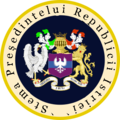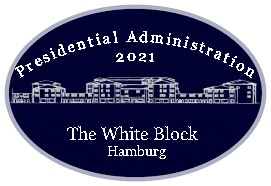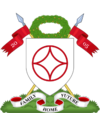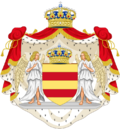President of Istria
| President of the Republic of Istria | |
|---|---|
 Seal of the President | |
| Government of Istria | |
| Residence | Palace of the White Block |
| Appointer | Popular vote |
| Term length | Three years |
| Formation | 7 September 2005; 16 years ago |
| First holder | Theodor Adin |
| Abolished | 2021 |
| Deputy | Prime Minister of Istria |
| Salary | 6450 RID (14,489 RON) |
| Website | Official twitter handle Official website |
The President of Republic of Istria (PORI) was the head of state of the Republic of Istria. The President directed the executive branch of the Presidential Administration and was Commander-in-chief of the Armed forces of the Istria. The President's power has grown over time.
History and Development
Origins
In 2005, the Independence Declaration of the Republic of Istria was signed, and with it the new Constitution of the republic. This states that the President is the head of state, with a small cabinet of five members. It has the executive power of promulgating bills into laws, decreeing military actions, and approving different positions into effect. His first and most important act was the Register no 1555. This had in it many pieces of information as to what is happening in the Republic, reports from ministers and other important information. He was decreeing through acts named conventions, that wore used back then to enforce law into effect. The conventions also had the power to order certain acts to be made for the president like reports, informative notes etc.
Development
The first President, Theodor Adin, made some changes in 2010 to the initial system, the old Register, now was replaced by a filing archive, the conventions were replaced by Presidential Decrees. This allowed the President more control but also gave the government it's unique act, the Emergency Command of the Government, that allowed the Government to have a legislative work, this ECG being transmitted as a bill to the Parliament. The Ministries wore ordered to do different reports about the state of the Nation that wore collapsed into one speech that was written every year in the front of the Parliament by the President.
Legislative powers
Promulgating and vetoing bills
The President's most significant legislative power derives from the Presentment Clause, which gives the President the power to veto any bill passed by the Parliament. While Parliament can override a presidential veto, it requires a two-thirds vote of both houses, which is usually very difficult to achieve except for widely supported bipartisan legislation. The veto is rarely used by the President. The Constitution states that he can also request the re-examination of the bill by the Chamber that sent it, and also, if advised to, send it to the Constitutional Court of Republic of Istria. If the Court decides that the bill isn't constitutional the bill is automatically veto.
The Presidential Decree is also signed by the Prime Minister, so it confirms that the law it's gonna be put in effect. The Presidential Decrees can also pardon personae, enforce impeachment of MOP, but can also state executive actions of the President. Although it is also used for executive purposes, the decree is more formally used for promulgations, when for executive actions are used the Executive Orders.
Executive orders
The president can also enforce law thru Executive Orders that do not require the Parliament's consent. This Orders are meant to be used in the most extraordinary cases and wore used along the history for military purposes, presenting honours and founding courts (EO no 1/2020, for the founding of the Extraordinary Military Court).
Setting the agenda
The President is required, upon his election, to present an official agenda. This agenda is required so his cabinet can know the specializations of its self. The Agenda is established by the president in a term of 20 to 30 days from its inauguration, and requires a set of letters between the Presidential Administration and the Government. To be noted that the Presidential Agenda isn't just the work of the President, but also the work of the Government that needs to keep that agenda for the terms.
After the 30 days of transitional period, the president presents in front of the joint Parliament of the Republic, the Agenda Address. This is a very important moment for the Administration that is officially invested in that day. The 30 days are used by the Parliament to do cabinet nomination hearings.
Executive powers
Foreign affairs
The President is required by the constitution to receive ambassadors. The reception clause, at is often called, was introduced to imply that the president possesses broad power over matters of foreign policy, and to provide support for the president's exclusive authority to grant recognition to a foreign government.
Commander-in-chief
One of the most important of executive powers is the president's role as commander-in-chief of the armed forces. The power to declare war is constitutionally vested in the Parliament, but the president has ultimate responsibility for the direction and disposition of the military. The exact degree of authority that the Constitution grants to the president as commander-in-chief has been the subject of much debate throughout history, with the Parliament at various times granting the president wide authority and at others attempting to restrict that authority.
Leadership role
Head of State
As head of state, the President represents the government of Istria to its own people, and represents the nation to the rest of the world. For instance, during a state visit by a foreign head of state, the President typically hosts a state arrival Ceremony held at the Front Pavilion.
As a national leader, the President also fulfils many less formal ceremonial duties. For example, Iordan Luca-Nicolae, rang a bell doing the 2017 Christmas State Dinner, before the prayer. This tradition enforces the start of the dinning.
Other presidential traditions are associated with Istrian Holidays. President Theodor Adin, on 7 September 2006 made an address to the nation at the Statue of Hamburgs Faminie. This started a tradition of ceremonies, know today as the Nation's Day.
Incumbency
Residence

The Palace of the White Block, Hamburg, is the official residence of the president. The palace, was first constructed for Redon Medas to live in and have it's official duties in it. Here was the capital of the Dristorian Empire's Politics, housing the Parliament. After the fall of the empire and communism, this became the official residence of the president, and also the official houses of parliament building. It was also known as "President's House" or "President's Palace". Iordan Luca gave it's official name in 2017. Here is also the Presidential Administration, and the Famous President's House Office.
Travel
The primary long and short distance ground travel, the President uses the presidential state car, which is an armored limousine designed to look like a Skoda Octavia IV Ambition 2021. The limousine has comfort endowments such as: seat heating, special audio settings, radio pick-up frequency, 230 V electrical outlet, minifridge, but also security settings such as: autoswitch to defending mode (barricade inside the car, airthight seal) special SOS buton on the roof panel of the driver, autopilot etc. The Istrian Secret Service operates and maintains the fleet of several limousines. The president also has access to two armored motor coaches, which are primarily used for touring trips.

Protection
The Istrian Secret Service is charged with protecting the president and the first family. As part of their protection, presidents, first ladies, their children and other immediate family members, and other prominent persons and locations are assigned Secret Service codenames.
Presidential codenames
- Theodor Adin – Călărețul (The Rider)
- First Lady Theodor Andrada – Printesa (The Princess)
- Iordan Luca – Vulturul (The Eagle)
- Former First Lady Iordan Andreea – Energica (Energy)
Prime-Ministrial codenames
- Andreianu Paul – Carisma (Charisma)
- Balminster Howard – Secretul (The Secret)
- Loyanovsky Nate – Cancan
- Alonzo Arnautoiu – Piticul (The Shorty)
- Petcu Adrian – Fericitul (The Joyful)
List of presidents
| # | CoA | Name (born-died) |
Tenure | Prime Minister | ||
|---|---|---|---|---|---|---|
| From | To | Term | ||||
| 1 | 
|
Theodor Adin | 7 September 2005 |
13 July 2013 |
7 years, 309 days | Andreiescu Paul
Balminster Howard Loyanovsky Nate Alonzo Arnautoiu |
| 2 | 
|
Iordan Luca-Nicolae | 13 July 2013 |
Incumbent | 8 years, 263 days | Alonzo Arnautoiu
Petcu Adrian |
Timeline

 |
General topics
Flag • Coat of Arms • Istrian Declaration of Independence • Awards and decorations • Hamburg • The Crown Jewels • Istrian Dinar • Kingdom of Istria Politics
Law Enforcement, Defence, and Civil Defence
Culture
|
|---|